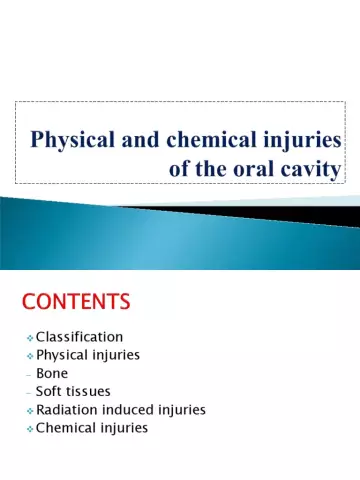- Author Rachel Wainwright wainwright@abchealthonline.com.
- Public 2023-12-15 07:39.
- Last modified 2025-11-02 20:14.
Oral cavity cancer
Brief description of the disease

Oral cancer is a malignant tumor that affects the mucous membrane of the mouth, tongue, and larynx. What distinguishes this type of tumor from many others is the ability to recognize it at the earliest stages and immediately begin treatment. However, not everyone pays attention to the primary symptoms, and as a result, the tumor spreads further and further, and treatment becomes more and more difficult. There is proof of this: 90% of those who died from oral cavity cancer could survive if they sought help on time. Despite the fact that oral cancer is perfectly diagnosed, in the United States it came out on top in the number of cases.
Oral Cancer Causes
It is generally accepted that oral mucosa cancer occurs due to prolonged smoking and alcohol consumption, and this is true! But there are many other factors that provoke tumor growth, for example:
- Mechanical trauma to the oral mucosa;
- Improper diet and lack of vitamin A;
- Eating very hot and spicy foods;
- Consuming smokeless tobacco blends such as nasvay.
Recently, it was found that the human papillomavirus (which causes cervical cancer in women) also plays an important role in the occurrence of cancer of the oral mucosa. This virus is only sexually transmitted.
Oral cancer symptoms
Oral cancer can start with a minor but long-lasting cold sore on the lip. In the cavity, you can observe ulcers, erosion, white and red spots, growths. Have you noticed any of these signs? See your dentist as soon as possible to determine if this is a sign of oral cancer.
The primary symptoms of oral cavity cancer may be hidden from our eyes, but based on internal sensation, discomfort, they can be identified. For example, the lymph node is severely inflamed or you notice changes in your voice. This is exactly where oral cancer begins.

It is customary to distinguish between three phases of the development of oral cancer symptoms:
The initial phase of cancer of the oral mucosa. There are unusual sensations in the area of the hearth. The pain is practically not felt. There is a thickening of the mucous membrane, ulcers, white bloom
Advanced phase of oral cavity cancer. A pronounced ulcer or papillary tumor appears. The pain gets worse. At this stage, most often people go to the hospital
Advanced phase of oral cavity cancer. The tumor becomes extremely dangerous and aggressive, quickly spreads to other tissues, increases in size, and causes severe pain
Oral Cancer Treatment
In case of cancer of the oral mucosa, three types of treatment are traditionally used: radiation therapy, chemotherapy, and surgery. In each case, the choice will depend on the general condition of the patient, on the size and stage of development of the oral cancer.
Before using radiation therapy, the function of the thyroid gland must be checked. If treatment of oral cancer with radiation is allowed, then the patient is placed in a special chamber, where the tumor is irradiated. Cancer cells are more sensitive than cells of healthy tissue, so they die quickly. Side effects include radiation burns to the face, sore throat, voice changes, etc
Localized tumors that do not invade adjacent organs are usually removed surgically. But if the tumor is too far away, then surgery can have unpleasant consequences for the patient: sometimes surgeons remove some organs to get to the tumor. For the most part, the removed organs can be replaced with prostheses
The essence of chemotherapy is to suppress the vital activity of cancer cells with the help of chemotherapy. The dose is prescribed by the doctor and depends on the phase of the tumor and its size. The drugs are injected into the bloodstream, which means that they act not only on oral cancer, but also on healthy cells. That is why there is a whole list of negative consequences after chemotherapy. Among them, weakened immunity, hair loss, diarrhea, vomiting and a number of other side effects
Prevention of oral cancer
- Regular examination by a dentist is a guarantee of the health of not only your teeth, but also the prevention of oral cavity cancer. Also regularly examine the larynx, tongue, and sides yourself.
- Use a lip sunscreen with a protection rating of at least 20 units.
- Try to follow a healthy lifestyle, i.e. exclude "smoke" and "drink with friends" items from your schedule.
- Safe sex guarantees you protection from many diseases, including oral cancer. Eliminate casual relationships, especially without contraceptives. The papilloma virus does not sleep.
YouTube video related to the article:
The information is generalized and provided for informational purposes only. At the first sign of illness, see your doctor. Self-medication is hazardous to health!






